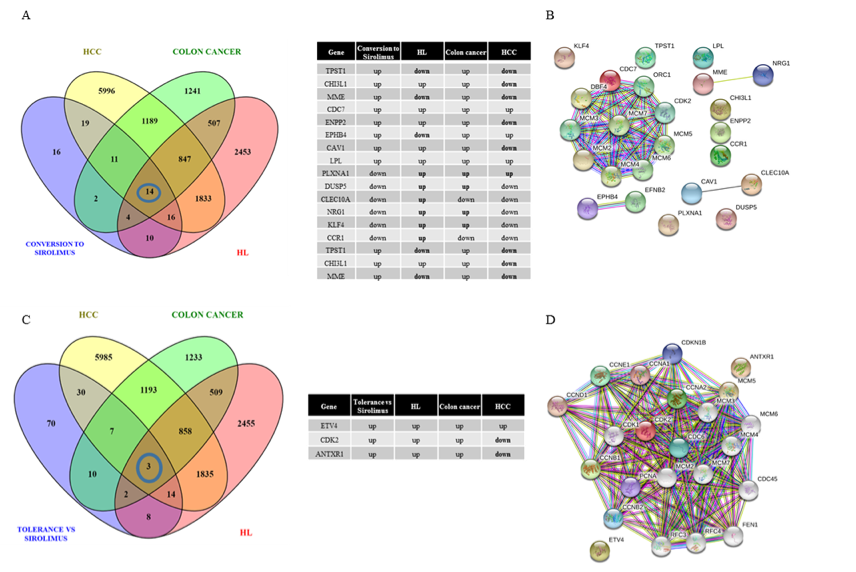Decreased Cancer Susceptibility in Tolerant Liver Transplant Recipients: Another Benefit of Tolerance?
1Multi-Organ Transplant, UHN, Toronto, ON, Canada, 2Department of Molecular and Experimental Medicine, The Scripps Research Institute, La Jolla, CA, 3Division of Gastroenterology & Hepatology, Department of Medicine, Northwestern University Feinberg School of Medicine, Chicago, IL
Meeting: 2019 American Transplant Congress
Abstract number: 150
Keywords: Gene expression, Hepatocellular carcinoma, Sirolimus (SLR), Tolerance
Session Information
Session Name: Concurrent Session: Liver Transplant Oncology
Session Type: Concurrent Session
Date: Sunday, June 2, 2019
Session Time: 4:30pm-6:00pm
 Presentation Time: 5:30pm-5:42pm
Presentation Time: 5:30pm-5:42pm
Location: Room 311
*Purpose: Long-term survival of transplant recipients is significantly impacted by malignancy. Induction of tolerance is feasible in a subset of liver transplant (LT) recipients. The aim of our study was to determine whether patients weaned off immunosuppression have favorable changes in their molecular profiles in regard to malignancy risk.
*Methods: Liver transplant (LT) recipients having undergone direct conversion from tacrolimus to sirolimus monotherapy, followed by successful weaned off of sirolimus at a later date (tolerance), were included. Gene expression profile on the whole blood was performed with Affymetrix HT HG-U133 Plus PM platform at the three time points. Key dysregulated genes, their overlap with hepatocellular carcinoma (HCC), colon cancer and Hodgkin Lymphoma (HL) datasets from Gene Expression Omnibus (GEO) and pathway enrichment analysis were obtained.
*Results: Twenty non-immune, non-viremic patients (age 57.2±8; 3.5±2.1 years post-LT)were included and eight of them achieved tolerance. Two independent analyses were performed 1) sirolimus conversion vs tacrolimus monotherapy, 2) tolerance time point vs sirolimus. Genes identified as dysregulated in each analysis were identified as affected in HCC, colon and HL but frequently with an opposite modulation, in particular compared to HCC (Figure 1A, C, D). These genes were involved in cell cycle (FDR p-value 2.28 e-12), DNA replication (FDR p-value 3.02e-10) and mitotic phase transition (FDR p value 1.85e-25). Figure 1: Overlap of the dysregulated genes affected at the different time points with HCC, colon cancer and HL and their protein-protein interactions obtained by STRING. Genes affected by conversion from tacrolimus to sirolimus (A,B), and sirolimus to tolerance (C,D) were identified.
*Conclusions: This unique longitudinal study of patients progressing from tacrolimus to sirolimus, and finally to tolerance reveals a potential added benefit to achieving tolerance, i.e. decreased cancer susceptibility on the basis of favorable changes in their molecular profiles. Future validation will include assessment as to whether these gene expression patterns predict reduced malignancy risk in patients who achieve tolerance.
To cite this abstract in AMA style:
Bhat MP, Pasini E, Baciu C, Kurian SM, Levitsky J. Decreased Cancer Susceptibility in Tolerant Liver Transplant Recipients: Another Benefit of Tolerance? [abstract]. Am J Transplant. 2019; 19 (suppl 3). https://atcmeetingabstracts.com/abstract/decreased-cancer-susceptibility-in-tolerant-liver-transplant-recipients-another-benefit-of-tolerance/. Accessed February 28, 2026.« Back to 2019 American Transplant Congress

